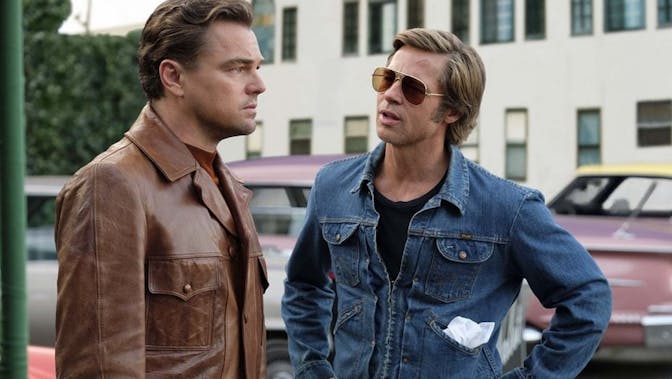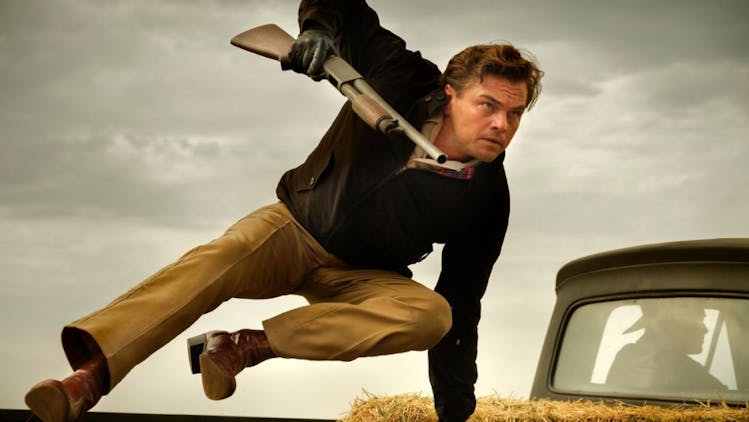We live in an entertainment era today where virtually every film produced is either a remake, a continuation of an ancient series or recycled story bits put together to make a film lacking any freshness. Leave it to the biggest film-lover in the world and one of the greatest filmmakers of all time to craft a film that not only eloquently reflects on the changing world surrounding pop culture and the entertainment industry, but to create one of the most original, charismatic films of all time.
Quentin Tarantino is known for crafting scripts with incredible dialogue, shocking violence, intense action and quirky characters. His films always find the humor surrounding everything, no matter how uncomfortable they may get. No working filmmaker today can generate such consistent, heart-stopping tension as Tarantino, nor can anyone excel in bringing out the fun in so many serious, gritty subjects.
Four years after the grizzly and wildly entertaining post-Civil War western “The Hateful Eight,” Tarantino transports us back in time to the late 1960s in sunny Los Angeles during the peak of Hollywood, where movie stars were respected icons, but several in the industry were unable to adapt to a rapidly changing environment.

“Once Upon a Time In Hollywood” follows former TV actor Rick Dalton (Leonardo DiCaprio) as he and his stuntman Cliff Booth (Brad Pitt) navigate through Hollywood in 1968-'69. Dalton is a fading actor best known for playing the fictional TV cowboy Jake Cahill in “Bounty Law,” an American television western series. Rick may be able to afford a house in Los Angeles and get roles regularly, but he hasn’t had a break to become a recognized star and fears the finish line of his career is nearing. It also doesn’t help that he lives next door to Sharron Tate, the real-life actress married to successful film director Roman Polanski.
Tarantino once again manipulates history to explore an alternate reality that still hangs on to the culture and environment of the time he chronicles. Unlike any film he has ever done, Tarantino creates a testament to two characters and a period that, while lacking a concrete story, in able to execute the film with a perfect vision filled with memorable dialogue and characters.
No other director can get away with altering history and creating a film that doesn’t follow a traditional narrative better than Tarantino. “Once Upon a Time In Hollywood” is his tribute to the films he grew up with, using his flawed, quirky characters as a mechanism to express the vibrant culture in Hollywood at the time.

Leonardo DiCaprio and Brad Pitt were the only two actors who could lead the film and generate the effect they do. Despite being two of the biggest movie stars in the industry today, DiCaprio and Pitt have blazing chemistry as two struggling players in the entertainment game that ignite the screen in witty humor and tremendous fun, their combination an instant screen classic.
While DiCaprio convinces us as a failing, dim-witted actor unlike his other dramatic roles, Brad Pitt steals the show as Cliff Booth. Pitt plays a low-life bum with an edge better than anyone. He’s every ounce of the word “cool” and his character is one of Tarantino’s most creative. Expect to see him as a serious contender for Best Supporting Actor at the next Academy Awards.
Many have pondered why Sharron Tate wasn’t as prominent of a figure in the film, but her existence in the film is very strategic. Tate serves as an idea rather than a complex character. She represents the success of Hollywood and is a stark contrast to Rick and Cliff. Margot Robbie captures the bubbly, lively spirit of Tate beautifully and her character is a terrific tribute to the late actress.

While not an essential storyline, the Manson Cult serves as a terrific conflict element that I wish was further explored. Tarantino spends so much time on Rick and Cliff’s dynamic that I wish we got to explore the other supporting characters introduced throughout the film more intimately, especially the intriguing members belonging to a violent cult.
Quentin doesn’t withstand from an absence of violence, and he includes a gruesome, cartoon-ish brutal sequence towards the end. While very exciting and at times funny, the actual violence is too over-the-top. I would have preferred a more dynamic action sequence towards the end involving more characters that played out like the spaghetti westerns depicted in Rick Dalton’s roles, for this would have been not only more exciting but could have resulted in traditional on-screen gun action instead of hand-to-hand brutality.
The Los Angeles that Tarantino creates is mesmerizing. This is a filmmaker with such an eye for detail that it becomes infectious through his production design. Master cinematographer Robert Richardson has such a focused, vivacious camera that captures the vision Tarantino has perfectly. Both men can make the seemingly unimportant and calm entertaining and intriguing, a characteristic few films contain nowadays.
Quentin Tarantino, once again, has proved he is a confident filmmaker with tremendous storytelling talent. His wisdom is expressed through his directing and writing in every frame of “Once Upon a Time,” in addition to his lead actors carrying all the years of their experience into their roles. This film isn’t just a story — it’s a vision. A vision of what Hollywood was like and how it has changed.
After I walked out of the theater, I paid attention to what other films were being played. Almost all were remakes or sequels of some sorts, none sparkling in originality. Tarantino has consistently avoided the inevitability of how movies aren’t what they used to be, how Hollywood is more concerned with making profits instead of making original films that are fresh for audiences.
“Once Upon a Time In Hollywood” may not have the tension, action, or intensity that other films from Quentin Tarantino contain. However, what this film does have is a rich identity, one with a purpose dedicated to exploring arguably the most critical time in Hollywood. Everyone apart of the film is fully on board with Tarantino’s vision, the result being a film like no other that will be celebrated for generations.
Final Grade: A+
Dominic LeRose is a staff writer for the Daily Cardinal. To read more of his work, click here.






